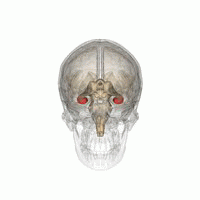| This is not a Wikipedia article: It is an individual user's work-in-progress page, and may be incomplete and/or unreliable. For guidance on developing this draft, see Wikipedia:So you made a userspace draft. Find sources: Google (books · news · scholar · free images · WP refs) · FENS · JSTOR · TWL |

Cogmed working memory training program is computer program that in collaboration with neuroscience, is claimed to improve working memory capacity for individuals who may suffer from working memory deficits. Although, cogmed is newly approach of intervention for various problems with working memory, such as ADHD, many researchers have other point of views and arguments against the program’s ability to improve working memory. [1]
The process
editThe cogmed training program is applied in 25 days, 5 days a week and for about 30-40 minutes long per session. Each session is designed so the trainee selects particular tasks that target a certain characteristic of working memory to train. The trainees would conduct the training through online server that is provided by Cogmed. Training could be done at home, office, school or a cogmed centre that is in one’s area. A cogmed qualified coach who will deliver guidance, motivation, structure and feedback to the trainee monitors the training or the trainee’s care givers about the progression. The program is challenging and also rewarding which requires sustained energy. The program has a characteristic to become difficult when a trainee is improving and easy when improvement is needed[2] [3].
memory deficits
edit- Transience - memories reduce with the passing of time. This occurs in the storage stage of memory, after the information has been stored and before it is saved. This can happen in sensory, short-term, and long-term storage. It follows a general pattern where the information is quickly forgotten during the first couple of days or years, followed by small losses in later days or years[4] .
- Absentmindedness - Memory failure due to the lack of attention. Attention plays a role in storing information into long-term memory; without proper attention, the information might not be collected, making it impossible to be saved later[5] .
The complete program includes
editInitial Interview – the trainee will be screened to assure eligibility and evaluate if the individual will benefit from training.
Start-up session – this session intends to deliver rigorous information about the structure and training style.
Weekly coach calls – the cogmed coach would call the trainee to motivate, deliver and get feedback from trainees.
Access to the Cogmed Training Web – trainees are provided access to the training website to view the statistics of their training and get feed back.
Wrap-up session – when the training is compete, the cogmed coach will debrief the raining and provide feedback from rating scales and the training website
Six months.
follow-up interview – The Cogmed Coach documents training effects again, with more time passed and the effects that are elicited.[3]

Research on Working Memory Training
editSupporting Research
editKlingberg and other researchers in Sweden during 2002 to 2003 conducted a multicenter, randomized, and controlled, double-blind trial to investigate the effect of improving WM by computerized, systematic practice of WM tasks.
Methodology Included in the trial were 53 children with ADHD (9 girls; 15 of 53 inattentive subtype), aged 7 to 12 years, without stimulant medication. The compliance criterion (20 days of training) was met by 44 subjects, 42 of who were also evaluated at follow-up 3 months later. Participants were randomly assigned to use either the treatment computer program for training working memory or a comparison program. The main outcome measure was the span-board task, a visuospatial WM task that was not part of the training program.
Results showed that for the span-board task, there was a significant treatment effect both post intervention and at follow-up. In addition, there were significant effects for secondary outcome tasks measuring verbal WM, response inhibition, and complex reasoning. Parent ratings showed significant reduction in symptoms of inattention and hyperactivity/impulsivity, both post-intervention and at follow-up.
Conclusions: This study shows that WM can be improved by training in children with ADHD. This training also improved response inhibition and reasoning and resulted in a reduction of the parent-rated inattentive symptoms of ADHD.
Implications: the researchers imply in this study that working memory can be improved by training and that they have seen effects on reasoning, response inhibition, and a decrease in parent-rated symptoms of ADHD.
Limitations: some of the limitations the authors suggested are that more studies are needed to be conducted on other populations to confirm effects and to find answers about the mechanisms underlying training induced working memory training. Also, the number of subjects was modest and additional follow up measures would have been useful[6] [7] . (Klingberg et al 2005)

Opposing Research
editIn Holmes study, the researchers evaluated the impact of two interventions, which are cogmed and a stimulant medication on working memory capabilities in children with ADHD. They examined 25 children between the ages of 8 and 11 years who were subjects in working memory training for 20 days, where they conducted working memory and IQ assessment before and after training, with and without prescribed medication.
Results show that medication improved visuo-spatial memory aspect, while training improved all aspects of working memory.
IQ scores were not affected by any of the interventions.
These findings indicate that working memory deficits in children with ADHD could be differently treated and overcome[8] .
The aim of Cogmed is to help children achieve their full potential. It can be in school or their homes. Other researchers thought that Cogmed Training program is such an example for a business program and is marketed to schools and parents of children with attention problems caused by poor working memory. Also, there is no clear evidence that could tell us that Cogmed can extend the range or the capacity of working memory.[9] In facet, does the program work and help those children? According to the Journal of Applied Research in Memory and Cognition (JARMAC) calls into question Cogmed's claims of improving working memory and attending underachievement due to working memory constraints. Shipstead et al (from the Georgia Institute of Technology) focused on the review and research that is used to back up the claims of Cogmed. They argue that many of the effects are not related to Cogmed training. Additionally, many of the attention tasks are unrelated to working memory problems. For instance, they suggested that there is limited transfer to real-life indexes of inattentive behavior, particularly in ADHD. The evidence that Cogmed training has any effect on cognition is unconvincing and thus, there is much more research needed to uncover mechanisms and facts about working memory training through such programs[10] .
References
edit- ^ Cogmed. "Cogmed: Program". Retrieved 5 December 2013.
- ^ Cogmed. "There is no mystery behind Cogmed training effects – this is how it works". Retrieved 6 December 2013.
- ^ a b Cogmed. "Cogmed:Method". Retrieved 5 December 2013.
- ^ Rovee, Collier (1999). "The Development of Infant Memory" (PDF). Current Directions in Psychological Science. 8: 80–85. Retrieved 5 December 2013.
{{cite journal}}: Unknown parameter|coauthors=ignored (|author=suggested) (help); Unknown parameter|month=ignored (help) - ^ Rovee, Collier (1999). "The Development of Infant Memory" (PDF). Current Directions in Psychological Science. 8: 80–85. Retrieved 5 December 2013.
{{cite journal}}: Unknown parameter|coauthors=ignored (|author=suggested) (help); Unknown parameter|month=ignored (help) - ^ Klingberg, Torkel. "Training of Working Memory". Cogmed. Retrieved 5 December 2013.
- ^ klingberg,, Torkel (8). "Training of Working Memory in Children With ADHD" (PDF). Journal of Clinical and Experimental Neuropsychology. 24: 781–791. Retrieved 5 December 2013.
{{cite journal}}: Check date values in:|date=and|year=/|date=mismatch (help); Unknown parameter|coauthors=ignored (|author=suggested) (help); Unknown parameter|month=ignored (help)CS1 maint: extra punctuation (link) - ^ Holmes, Joni (june). "Wroking memory deficits can be overcome:Impacts of training and medication on working memory in children with ADHD". Applid cognitive psychology. 1589.
{{cite journal}}:|access-date=requires|url=(help); Check date values in:|date=and|year=/|date=mismatch (help); Unknown parameter|coauthors=ignored (|author=suggested) (help) - ^ Shipstead, Zach (2012). "Cogmed working memory training: Does the evidence support the claims?". Journal of Applied Research in Memory and Cognition. 1 (3): 185–193. doi:10.1016/j.jarmac.2012.06.003.
{{cite journal}}: Unknown parameter|coauthors=ignored (|author=suggested) (help); Unknown parameter|month=ignored (help) - ^ Olesen, Pernille (14). "Increased prefrontal and parietal activity after training of working memory". Neuroscience. 7: 75–78.
{{cite journal}}:|access-date=requires|url=(help); Check date values in:|date=and|year=/|date=mismatch (help); Unknown parameter|coauthors=ignored (|author=suggested) (help); Unknown parameter|month=ignored (help)
External links
edit- Working Memory Training
- Smith Ely Jelliffe (1920). . Encyclopedia Americana.
- Models of Working Memory (Mechanisms of Active Maintenance and Executive Control
- Working memory web forum exists for researchers to post reference information for relevant journal articles and to discuss stimuli, test resources, etc
- Peter Doolittle: How your "working memory" makes sense of the world, TED Talk, published November 22, 2013.
Category:Problem solving
Category:Human behavior
Category:Memory Category:Neuropsychological assessment Category:Sources of knowledge Category:Mental processes
